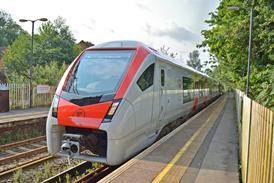THE RESPECTED Institute of Economic Affairs must have been aghast. Its June 26 conference on The Future of UK Rail was intended to celebrate the first anniversary of a 10-year funding package that would see £63bn of public cash and private capital pour into Britain’s privatised railway, leading to 50% more passenger-km and 80% more tonne-km by 2010 (RG 9.00 p541). Instead, the industry’s leaders, including the three principal regulators, were at each others’ throats, desperate to shovel blame for the monumental fiasco of a near-total funding collapse on to somebody else’s shoulders.
The basic concept of the package was that government funding would hold the annual revenue subsidy at £1·5bn instead of reducing it as originally planned. This would enable passenger operators to bid for new 20-year franchises that required them to invest heavily in new trains and infrastructure, boosting quality and capacity and thus generating more revenue. Railtrack would also borrow heavily in the expectation of higher track access charges. In addition, social benefits justified £15bn of capital grants towards a total investment spend of £49bn over the decade.
The traumatic events of the past year - not least (but not only) the 185 km/h derailment last October at Hatfield and the chaos which followed - brutally exposed the inability of a fragmented and deeply flawed structure to support this vision. Instead of the anticipated reduction of 20% or more, contracting out not just the physical work of maintaining and renewing the network but also engineering and inspection has actually driven costs up by some 30%.
Worse still, Railtrack’s estimates for major enhancement projects have rocketed. A recent analysis for the June 28 issue of our UK newsletter Rail Business Intelligence reveals that in real terms costs are now two to three times higher than in British Rail days. Thus the East Coast Main Line was electrified by BR in 1984-91 for £1·1m/route-km in today’s money. Merely upgrading the already electrified West Coast Main Line with no new route is now costed at £9·8m/km, and a current review seems certain to increase this. SNCF completed TGV Méditerranée in June, including 13 km of tunnels, for £10m/km!
The appalling truth finally dawned on investors when Railtrack asked for £1·5bn more in January, and when this was granted in April, promptly demanded another £2bn (at least) in May just to stay afloat. The share price collapsed to around £3, robbing the company of creditworthiness and credibility. Strategic Rail Authority Chairman Sir Alastair Morton admitted on June 26 that ’the SRA’s £29bn is now over-committed without any noteworthy enhancement programme, and the private sector’s £34bn sits under big question marks as the main player, Railtrack, shrinks.’
Three days later, the new Secretary of State responsible for transport, Stephen Byers, issued revised ’draft directions and guidance’ on franchising and announced that Sir Alastair would go just as soon as a replacement could be found. More than two years after he became Chairman, not a single 20-year franchise has been signed and there is no strategic plan. How could there be? Railtrack had proved incapable of costing accurately, and without this assurance, the Treasury refused to approve any infrastructure funding proposals built into franchise bids. So franchising is stalled, and there is effectively a moratorium on infrastructure projects because Railtrack says it can neither fund nor manage them.
What little progress had been made with the franchise extension programme was thrown into further confusion on July 16, when Byers called in a policy statement for the SRA to ’concentrate on improving services for passengers within existing franchises, or by negotiating short two-year extensions.’ And to prove the point, he announced on July 18 that a 20-year franchise for InterCity East Coast would not be awarded. Instead he ’invited’ the SRA to negotiate a two-year extension to April 2005 with existing franchisee Great North Eastern Railway. While he has not specifically ruled out long-term franchises, the prospects of a national rail investment programme have all but evaporated.




















